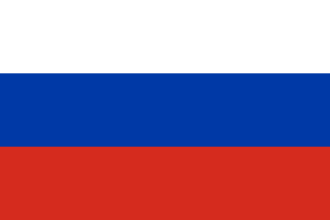Russia
File:National Anthem of Russia (2000), instrumental, one verse.ogg


== Russia ==


Russia (Russian: Россия , Rossiya), officially the Russian Federation (Russian: Российская Федерация , Rossiyskaya Federatsiya), is a transcontinental country spanning Eastern Europe and Northern Asia. It is the largest country in the world by land area, covering over 17 million square kilometers, and encompassing more than one-eighth of Earth's inhabited land area. Russia extends across eleven time zones and borders sixteen sovereign nations, the most of any country in the world.
History[edit]
The history of Russia begins with the East Slavs, who emerged as a recognizable group in Europe between the 3rd and 8th centuries AD. The medieval state of Kievan Rus' arose in the 9th century and adopted Christianity from the Byzantine Empire in 988, beginning the synthesis of Byzantine and Slavic cultures that defined Russian culture for the next millennium. Kievan Rus' ultimately disintegrated into a number of smaller states; most of the Rus' lands were overrun by the Mongol Empire and became tributaries of the nomadic Golden Horde in the 13th century.
Geography[edit]
Russia's geography is diverse, with vast plains, forests, tundra, and mountain ranges. The Ural Mountains form a natural divide between European and Asian Russia. Major rivers include the Volga River, the longest river in Europe, and the Siberian rivers such as the Ob River, Yenisei River, and Lena River. Russia has a wide range of climates, from humid continental in much of European Russia to subarctic and tundra in Siberia and the Far East.
Government and Politics[edit]
Russia is a federal semi-presidential republic. The President of Russia is the head of state, and the Prime Minister of Russia is the head of government. The Federal Assembly of Russia is the national legislature, consisting of the State Duma (the lower house) and the Federation Council (the upper house). The Constitution of Russia was adopted by national referendum on December 12, 1993.
Economy[edit]
Russia has a mixed economy with state ownership in strategic areas of the economy. It has an abundance of natural resources, particularly oil and natural gas. Russia is one of the world's leading producers of oil and natural gas. The country is also a major exporter of metals such as steel and aluminum.
Demographics[edit]
Russia is the ninth most populous country in the world, with a population of over 144 million people as of 2021. The majority of the population is ethnic Russian, but there are over 190 ethnic groups and indigenous peoples in Russia. The official language is Russian, and the country is known for its rich cultural heritage, including literature, music, and ballet.
Culture[edit]
Russian culture has a long and rich history, steeped in literature, ballet, painting, and classical music. Notable Russian authors include Leo Tolstoy, Fyodor Dostoevsky, and Anton Chekhov. Russia is also famous for its contributions to classical music, with composers such as Pyotr Ilyich Tchaikovsky, Sergei Rachmaninoff, and Igor Stravinsky.
Related Pages[edit]
- Moscow
- Saint Petersburg
- Siberia
- Russian Revolution
- Soviet Union
- Vladimir Putin
- Russian language
- Trans-Siberian Railway
|
Coordinates:
55°45
N°37
Ad. Transform your life with W8MD's Budget GLP-1 injections from $75


W8MD offers a medical weight loss program to lose weight in Philadelphia. Our physician-supervised medical weight loss provides:
- Weight loss injections in NYC (generic and brand names):
- Zepbound / Mounjaro, Wegovy / Ozempic, Saxenda
- Most insurances accepted or discounted self-pay rates. We will obtain insurance prior authorizations if needed.
- Generic GLP1 weight loss injections from $75 for the starting dose.
- Also offer prescription weight loss medications including Phentermine, Qsymia, Diethylpropion, Contrave etc.
NYC weight loss doctor appointmentsNYC weight loss doctor appointments
Start your NYC weight loss journey today at our NYC medical weight loss and Philadelphia medical weight loss clinics.
- Call 718-946-5500 to lose weight in NYC or for medical weight loss in Philadelphia 215-676-2334.
- Tags:NYC medical weight loss, Philadelphia lose weight Zepbound NYC, Budget GLP1 weight loss injections, Wegovy Philadelphia, Wegovy NYC, Philadelphia medical weight loss, Brookly weight loss and Wegovy NYC
|
WikiMD's Wellness Encyclopedia |
| Let Food Be Thy Medicine Medicine Thy Food - Hippocrates |
Medical Disclaimer: WikiMD is not a substitute for professional medical advice. The information on WikiMD is provided as an information resource only, may be incorrect, outdated or misleading, and is not to be used or relied on for any diagnostic or treatment purposes. Please consult your health care provider before making any healthcare decisions or for guidance about a specific medical condition. WikiMD expressly disclaims responsibility, and shall have no liability, for any damages, loss, injury, or liability whatsoever suffered as a result of your reliance on the information contained in this site. By visiting this site you agree to the foregoing terms and conditions, which may from time to time be changed or supplemented by WikiMD. If you do not agree to the foregoing terms and conditions, you should not enter or use this site. See full disclaimer.
Credits:Most images are courtesy of Wikimedia commons, and templates, categories Wikipedia, licensed under CC BY SA or similar.
Translate this page: - East Asian
中文,
日本,
한국어,
South Asian
हिन्दी,
தமிழ்,
తెలుగు,
Urdu,
ಕನ್ನಡ,
Southeast Asian
Indonesian,
Vietnamese,
Thai,
မြန်မာဘာသာ,
বাংলা
European
español,
Deutsch,
français,
Greek,
português do Brasil,
polski,
română,
русский,
Nederlands,
norsk,
svenska,
suomi,
Italian
Middle Eastern & African
عربى,
Turkish,
Persian,
Hebrew,
Afrikaans,
isiZulu,
Kiswahili,
Other
Bulgarian,
Hungarian,
Czech,
Swedish,
മലയാളം,
मराठी,
ਪੰਜਾਬੀ,
ગુજરાતી,
Portuguese,
Ukrainian
- Pages with broken file links
- Articles containing Russian-language text
- Pages using Lang-xx templates
- Russia
- Countries in Europe
- Countries in Asia
- Transcontinental countries
- Russian-speaking countries and territories
- Federal countries
- Members of the United Nations
- G20 nations
- BRICS nations
- Countries in the Northern Hemisphere
- Countries in the Eastern Hemisphere
- Country stubs
